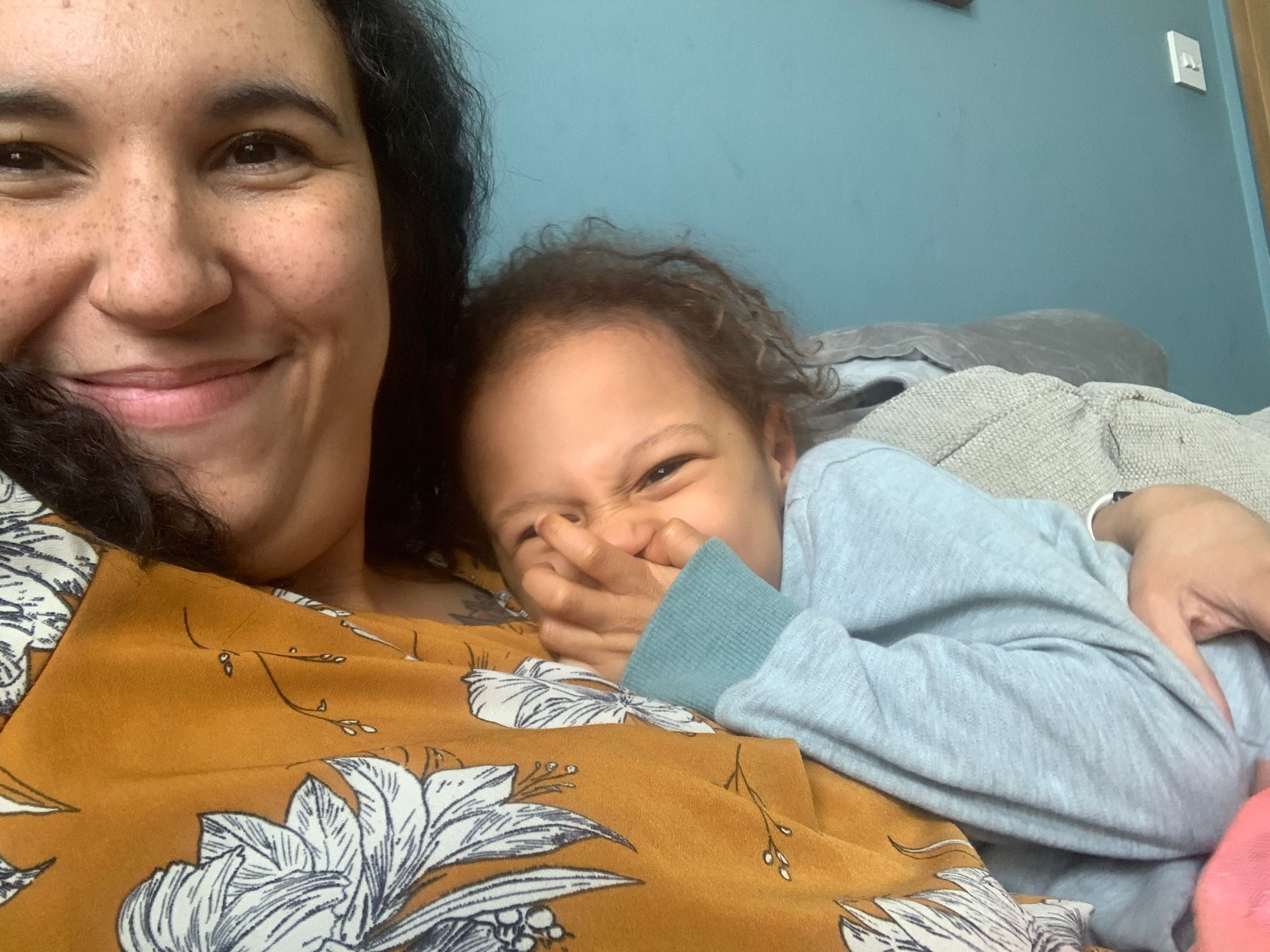
Parent Carer Collective: Amy Rutter
by Hibi
Mar 17, 2024
Meet the PDA autism mum who’s cheering on a community of fellow parent caregivers – and relishing “micro moments” of self-care.
Before her now six-year-old son, Rudy, came along, Amy Rutter’s only reference points for autism were Dustin Hoffman’s Rain Man character and the cast of British reality series The Undateables. Nowadays, alongside her partner, Robin, this Northampton local is very aware of what parenting a child who has pathological demand avoidance (PDA) autism and attention deficit hyperactivity disorder (AuDHD) is like.
While navigating the challenges her family has faced since the UK covid lockdowns came into play, Amy supports others caregivers through her Facebook community, Parent Carer Cheerleading Squad. She’s also finding small pockets of time for herself, currently filled with reading Maybe in Another Life by Taylor Jenkins Reid, rewatching Motherland and listening to the One Day soundtrack.
Here, Amy shares some of her story and advice for fellow autism families.
Can you compare your initial thoughts and feelings around parenting and caring for a child with autism to how you feel now?
I’ll be honest, there was a rollercoaster of emotions when we got the diagnosis! I knew it was coming but I felt a sense of grief. Grief for my son – not because he’s autistic, but because I knew that meant we would have a tricky road ahead for him. There was also a sense of relief and validation – we weren’t imagining it!
More recently, it’s been hard to turn away from the preconceived ideas of what parenting and a child’s ‘behaviour’ should look like. I’m trying to learn more about my son, and how to support him, and let go of society’s expectations.
Nowadays, what does caring for your son tend to look like?
My son is in burnout which is really tricky to manage, especially since me and his dad are in burnout, too. I’m neurotypical, Robin is also PDA AuDHD, and we get very little time to rest. Rudy hasn’t left the house since the first lockdown four years ago, due to anxiety and sensory overload.
He’s never been to school and instead has an Education Otherwise Than at School (EOTAS) package where a tutor and therapists all come to our house. That was going well until Christmas, when he stopped letting anyone in.
At that point we realised Rudy was PDA and in burnout. We then started adopting a low-demand approach and using declarative language. Things got worse to start with but I can see micro moments of progress now!
How did you start forming connections with other parents raising kids with autism, and what changed for you once you started forming these connections?
I’ve found so many other supportive parents in various Facebook groups, and I’ve learned so much from other parents. When we received my son’s diagnosis, we were given a few leaflets and sent off on our merry way. I’ve done so much research and reading myself, and picked up so many tips from other parents. It’s made a world of difference.
One of my closest friends now is another PDA mum who lives locally. In the 18 months we’ve known each other, we’ve only met face-to-face a couple of times, but we message each other most days.
What do you find most challenging about being a parent carer? And on the flipside, what brings you the most joy?
The most challenging thing is definitely regulating myself while Rudy is having a meltdown, when I’m feeling exhausted. It’s hard to keep my own nervous system regulated for him while, inside, my stress levels are going through the roof. I’m getting better at staying calm, but I’m not perfect and sometimes I do snap at him – and then feel awful afterwards.
Everything about Rudy brings me joy! He’s a happy and fun boy. He’s kind, clever and imaginative. I wish I could share him with the world because he’s amazing.
What supports have you put around yourself – or do you hope to put around yourself?
Carving out a big chunk of time for myself just isn’t possible, so I try to find micro moments of self care every day. Reading some of my book, savouring a hot coffee, listening to some music that I know lifts my spirits, dancing or jumping on the spot to help with stress, doing a five-minute meditation when I finish work. These tiny acts of self care all add up.
I’ve found other parents such a help that I’ve created my own supportive community called Parent Carer Cheerleading Club. It’s a safe space for parents of children with additional needs to not only share challenges and seek advice, but to celebrate the good things and have other parents who get it and celebrate with you.
How has the Hibi app helped your family, and what features do you use the most?
While my son is in burnout, we’re using the Hibi app to track everything about him so that over time we can zoom out and hopefully spot patterns or evidence that he is slowly coming out of burnout.
What do you wish other people knew about life as a parent carer? And how do you wish other people responded to/approached you and your family?
If I don’t answer your messages straight away, please don’t take offence! It can take days for me to reply because it takes so much energy and often it’s hard to explain PDA and what’s going on with my son.
I can’t always come to social events, but please don’t stop inviting me.
Every now and then, just ask me how I am.
If you want to help, don’t ask what you can do to help because I don’t know and that makes me feel a bit helpless. We desperately need help but it’s so hard when we can’t have anyone in the house. So don’t ask me, just think of something that might be helpful and supportive, and do it. I’ll be forever thankful.
What advice do you have for parents who are new to caring for a child with autism?
Everything seems so overwhelming to start with and you’re no doubt reading everything you can get your hands on. Slow down. You don’t have to have this all figured out straight away.
You are the expert on your child and if someone’s advice doesn’t sit right, you don’t have to do it. You know your child best, so if one thing isn’t working, learn from that and try something else.
You are not alone. There are other parents who have been there and can be a shoulder to cry on and a little cheerleader in your pocket.
You can follow Amy’s story on Instagram, join her Facebook community, and subscribe to her newsletter, notes from the sidelines.
Let’s clear out the complexities of care. Try Hibi for free here.
Want to share your parent-carer story? We’d love to hear it. Get in touch with our team at hello@hibi.health



